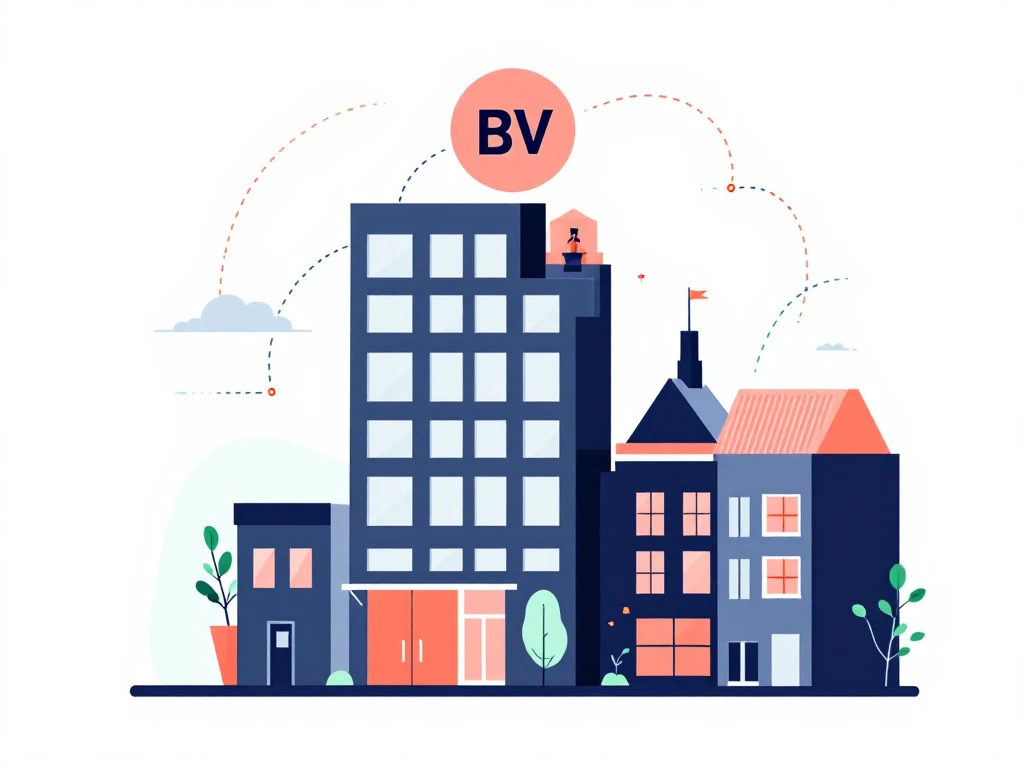Yes, you can rent premises from your own private limited company. This is a completely legal arrangement where you, as a private person, enter into a rental agreement with your own private limited company as landlord. The main condition is that all arrangements are business and market-based, meaning that the rent must be comparable to what other tenants would pay for a similar property. This separation between you as a natural person and your BV as a legal entity makes this construction possible and offers several financial advantages.
What does it mean to rent premises from your own limited liability company?
Renting a building from your own private limited company means that you, as an entrepreneur, enter into a private rental agreement with the private limited company of which you are a (major) shareholder. You then wear two hats: as lessee you are a natural person, as lessor your BV acts as a legal entity. This legal separation is fundamental to the Dutch legal system.
The BV is an independent legal entity with its own rights and obligations. This means that the BV can own property and rent it out, including to its own director-major shareholder. As a private person, you pay rent to the BV, which then books this rental income as revenue. This construction is not only possible but also very common in the Netherlands.
The most important principle is that all transactions between you and your limited liability company are at arm's length. This means that you must apply the same conditions as if you were to rent the property to any third party. The Inland Revenue is watching this closely to prevent entrepreneurs from abusing this construction for tax advantages.
Can you just rent premises from your own limited liability company?
You may indeed rent premises from your own limited liability company, but not "just like that." There are strict conditions you must meet. The most important requirement is that everything business and market-based happens. This means that the rent, rental terms and all other arrangements must be comparable to what is common in the market.
The IRS uses the arm's length test to assess whether the construction is acceptable. They look at:
- Whether the rent is market-based
- Whether a written lease is in place
- Whether the rent is actually paid
- Whether all agreements are business related
- Whether records are kept correctly
In addition, you must consider tax transparency. This means you must be open and honest about the construction in your tax return. In both your private and corporate tax returns, you must correctly account for the rental relationship.
What are the advantages of renting premises from your limited liability company?
Renting premises from your limited liability company offers several advantages for entrepreneurs. The main advantage is the possibility of wealth building within the limited liability company. By paying rent to your limited liability company, you are building equity in the company where a lower tax rate may apply than in private.
Another important advantage is flexibility of use. As a tenant, you can relatively easily modify or terminate the lease when your business situation changes. This is especially useful if you want to move, for example, or if your seeking more information about renting office space at another location.
The risk spread between private and business assets is also a major plus. The real estate remains the property of the BV, protecting your private assets from business risks. Moreover, if structured correctly, you can benefit from tax advantages, such as deduction of maintenance costs and depreciation within the BV.
What are the tax rules when rented out by your own limited liability company?
The tax rules when leasing by your own limited liability company are complex but important to apply correctly. For the BV, rental income counts as taxable sales on which corporate income tax must be paid. However, the BV can also deduct costs such as maintenance, depreciation and financing costs.
For you as a tenant in private, rental expenses are not deductible unless you use part of the property for business purposes. In that case, you can claim a proportional part of the rent as business expenses. The arm's length test plays a central role here: all conditions must be market-based.
Important tax issues to consider:
- Market rent is required
- VAT exemption usually applies to rental property
- Corporate tax on the net rental income in the BV
- No deduction of rental expenses in private (unless business use)
- Documentation must be in order for the IRS
How do you determine a market rent?
Determining a market-rate rent is essential to the pragmatism of construction. Start by gathering comparables from similar properties in the same area. Look at factors such as location, size, state of repair and amenities.
Hiring a professional appraiser is often the best approach. An appraiser can provide an objective opinion of the market value of the rental. This valuation report serves as substantiation for the Internal Revenue Service and prevents discussions afterwards. The cost of an appraisal usually outweighs the security it provides.
Online platforms and brokerage websites also offer valuable information about rental prices in the area. Document your research well by taking screenshots and saving ads. You can use this documentation if the IRS asks questions about the amount of rent.
What documents do you need for this construction?
You need several documents to properly execute the lease construction. The most important document is a formal lease between you as a private person and the BV. This contract should contain all the usual provisions such as rent, term, notice period and maintenance obligations.
Essential documents for this construction:
- Written lease with all terms and conditions
- Valuation report or market research for rent
- Bank statements showing rent payment
- Minutes of the AGM approving the letting
- Any amendments to the BV's articles of association
The administrative record must be correct both in the BV administration and in your private administration. Keep all documents for at least seven years and make sure they are readily available in case of questions from the tax authorities. Proper documentation prevents problems and discussions afterwards.
What are the risks of hiring your own BV?
Renting your own limited liability company involves several risks that you need to be aware of. The biggest risk is a tax correction if the Internal Revenue Service judges that the terms are not market compliant. This can lead to retroactive assessments, penalties and the loss of tax benefits.
Administrative burden is another concern. You have to keep two administrations and ensure that all transactions are processed correctly. This takes time and possibly additional costs for administrative support. The complexity increases especially if you later want to sell the property or end the construction.
The construction can also affect mortgage options. Banks look critically at real estate in a limited liability company and financing options may be more limited. You also need to consider the implications for your pension accrual and long-term wealth planning.
When is this construction interesting for entrepreneurs?
The construction is especially interesting when you use the property substantially for business. For example, if you use more than 70% of the property for your business, the benefits may outweigh the administrative burden. Also at wealth planning it may be interesting to transfer real estate into the BV.
For business succession, this structure also offers opportunities. It is easier to transfer shares than real estate, so succession can be more flexible. If you need flexibility in real estate use, for example because your business is growing or shrinking rapidly, renting from your own limited liability company offers more options than owning privately.
The construction is less interesting for small business owners with limited business use of the property. Also, if you have few assets in the BV or if the administrative burden does not outweigh the benefits, it is better to choose another solution.
What about VAT when renting to yourself?
Rental of real estate is in principle exempt from VAT. This means that your BV does not have to charge VAT on the rent you pay. This exemption applies automatically and you do not have to apply for it. The disadvantage, however, is that the BV cannot reclaim VAT on costs related to the leased property.
There is an option to opt for taxed rentals, but this is only possible with business use of the property. If you use the property for more than 90% business purposes, you and your BV can jointly opt for VAT-taxed rentals. This has the advantage that the BV can reclaim VAT on maintenance costs and investments.
The administrative obligations with VAT-taxed rentals are more extensive. You have to prepare VAT invoices, submit VAT returns and keep VAT records. Consult with your accountant or tax advisor whether VAT-taxed rentals are advantageous in your situation.
What happens if you don't pay the rent to your limited liability company?
Not paying rent to your BV has serious consequences. The IRS can interpret this as a disguised profit distribution, on which you have to pay income tax. In addition, you are undermining the pragmatism of the entire structure.
If the rent is structurally not paid, the Internal Revenue Service may question the entire rental arrangement. This can lead to a reclassification in which all tax benefits are reversed. You may then face retroactive assessments over several years plus penalties and interest.
For the BV, a claim arises against you as director-major shareholder. This receivable must be recorded in the books and may affect the financial statements. If the receivable is too high, questions may arise about the continuity of the BV and your personal creditworthiness.
Can you also rent property from your limited liability company?
Renting a home from your BV is possible but has stricter rules than for business properties. For the tax authorities, your own home is considered private use, so no business deduction is possible. You must take into account the home equity or an additional charge for private use.
If you rent a home from your limited liability company that is not your primary residence, different rules apply. Think, for example, of a vacation home or a second home. The rent must be in line with the market and you may have to deal with an addition in Box 1 for the benefit you enjoy.
The administrative requirements are extra strict with housing. You must be able to prove that the rent is market-based by documenting comparable housing supply. It must also be clear that it is not a construction to avoid tax. Get proper advice before renting a home from your limited liability company.
Important points to consider when hiring your own BV
When setting up a rental structure with your own limited liability company, several points of interest are important. Always make sure the rent is in line with the market and put all agreements in writing. The documentation must be in order from the beginning to avoid problems with the Tax Office.
Practical tips for successful construction:
- Seek professional advice from a tax advisor or accountant
- Get an independent appraisal for substantiation
- Draft a full lease with all the usual provisions
- Pay rent punctually each month by direct debit
- Keep accurate records in both entities
- Evaluate annually whether the construction is still beneficial
Renting premises from your own limited liability company can be a smart solution for business owners seeking flexibility in their property use. With the right approach and documentation, it's a completely legal structure that can provide financial benefits. Want to learn more about the possibilities for your specific situation? Then take contact with us for personal advice on flexible office solutions that suit your business.

